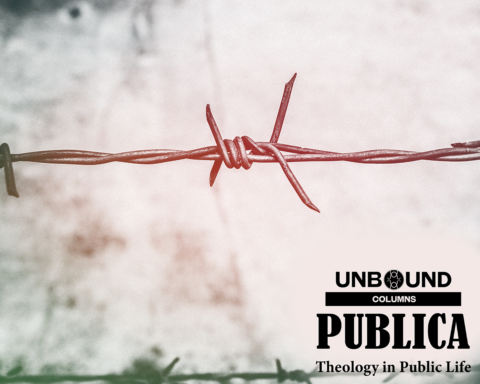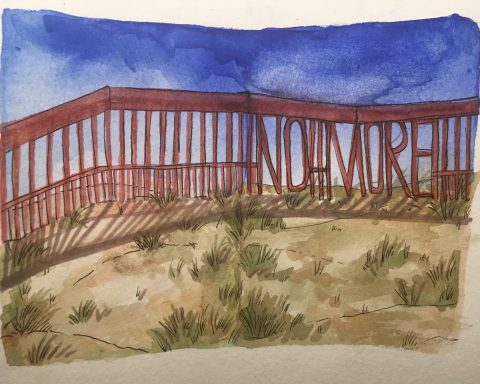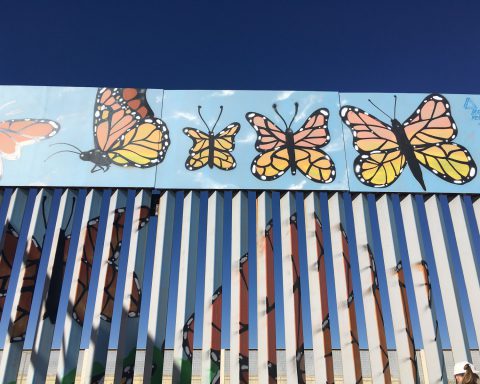
You’ve surely heard of sanctuary congregations, restaurants, universities and cities. You probably have listened to their political opponents snark and snarl when they say the word “sanctuary”. But it is a religious word that they are politicizing. I write to create a safe space for that word.
Religious institutions often call their buildings sanctuaries. By that we mean a welcoming safe space for the holy and for the people loved by the Holy One. In sanctuaries many people pray the Lord’s Prayer, or “Our Father,” which recites as ‘Forgive us our debts as we forgive the debts of others.” Sometimes debt is sin or trespass. The translations vary. The motion does not. This is one of Jesus’ most karmic instructions. We can’t expect forgiveness unless we know how to forgive, but what goes around comes around. What we give we can receive. What we cannot give we cannot receive.
___________________________________________
You probably have listened to [sanctuary congregations’] political opponents snark and snarl when they say the word “sanctuary”. But it is a religious word that they are politicizing.
___________________________________________
Sanctuaries are sites of forgiveness. We go there to form the habit of forgiveness – and often began our services with a confession and an absolution as well as praying the Lord’s Prayer. In sanctuary, we “stand our ground,” the way others stand their ground against intruders through a revival of an ancient law. In sanctuary we stand our moral ground, regarding welcome and forgiveness.
Religious people of all kinds hold forgiveness as central to our faith. How does this apply? Immigration officials are actively deporting people with so-called “prior offenses”. The great majority of these people have paid their dues and gone to jail or prison for their offenses. They are now being deported to pay again for their offenses. That is double jeopardy and puts the lie to either forgiveness or reparation for sin. At the same time, the great religious words of forgiveness, “sanctuary” and “harboring”, are being debased. In these deportation sweeps, the state is attacking the very principle of forgiveness, as well as the forgiven people.

by Vincent Willem van Gogh
{PD-1923: Published before 1923 and
public domain in the US}
Congregations who provide sanctuary to endangered people are only doing what we always do. We provide safe spaces to everyone, not just people being attacked by the state. Jesus lifts up the Good Samaritan who wisely helps a stranger without fear that he might be dangerous. I do not accept the premise that immigrants are dangerous to us. They are not. The entire operation of ICE is built on this false premise – that it is making us safe from dangerous immigrants. It is a big lie. Strict immigration enforcement and the banning of refugees are both making us more endangered, not more safe. Immigrants have a lower record of criminality than the general population, for both violent and property crimes. In the refugee ban we are confirming the terrorist narrative that we are intolerant, not challenging it.
___________________________________________
In the refugee ban we are confirming the terrorist narrative
that we are intolerant, not challenging it.
___________________________________________
Forgiveness itself is being deported in the biggest lie of all: that America is somehow to be first. Seriously? Did God say that? I seem to remember Jesus saying, “The first shall be last, and the last shall be first.” Sanctuary is about putting the last first, as a matter of conscience.
Even conservatives believe that religious people are allowed the right to claim conscience. In the Hobby Lobby case, they called it the right of religious refusal. Religious people are allowed the right to claim conscience. How can the state ask religious institutions to violate the principle of forgiveness? Or not give sanctuary when that is our main reason to exist?
___________________________________________
How can the state ask religious institutions to violate the principle of forgiveness?
___________________________________________
Or what about the pledge of allegiance? “I pledge allegiance to the flag of the United States of America, and to the republic for which it stands, one nation under God, indivisible, with liberty and justice for all.” David Letterman quipped, “Do you really think this is a good time to take God out of the pledge?” I have strong allegiance to this nation under God. I still believe it can be great. I can never believe it will be first.
At my ordination, they asked me, “Will you seek to regard all people with equal love and concern and undertake to minister impartially to the needs of all?” I said, while kneeling, “Yes.”
There is only one executive order, at least for me. Our Creator, who is in heaven, is hallowed. Not the United States. And that Creator commands us to love our neighbor as ourselves. With all due respect to the President, and our nation’s laws, I have previous allegiances to the Lord’s Prayer, the Pledge of Allegiance, and my ordination that require my respect for sanctuaries.
Sanctuary is a Word from God.
[1] Maciag, Mike. “The Mythical Link Between Immigrants and High Crime Rates.” March 2, 2017. http://www.governing.com/topics/public-justice-safety/gov-undocumented-immigrants-crime-pew.html
*****
AUTHOR BIO:

Rev. Dr. Donna Schaper has written 30 books, usually concerning spiritual responses to material problems, such as rituals to sustain activists and Sabbath keeping in the “time famine”. She is senior pastor to Judson Memorial Church, founder of the New York City New Sanctuary Movement, and an active community builder.
Donna writes of herself: “My life mission is spiritual nurture for public capacity. This mission grounds me in my first love, which is parish ministry. I also love teaching people in leadership situations beyond the parish, like community organizations, chaplaincies, and non-profits. Action-reflection is a method I learned at the University of Chicago Divinity School, and I have treasured it ever since. Preaching, pastoring and building community (or rebuilding community) are my strengths and graces.”






Unbound Social